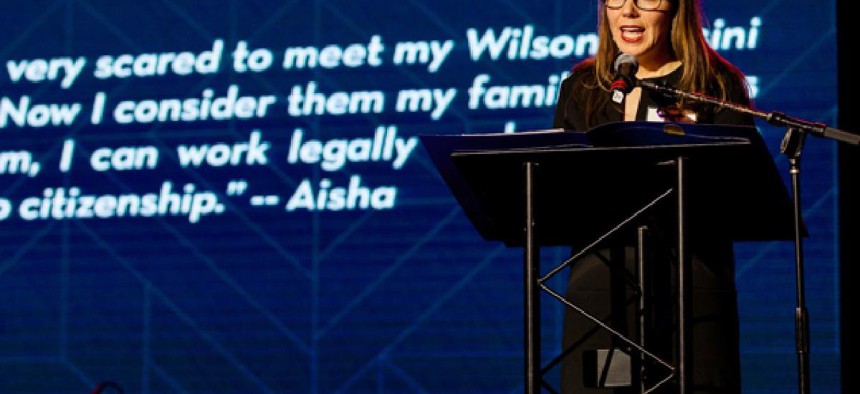Front Line Hero: Carmen Maria Rey, Immigration Intervention Project

Despite a 2016 initiative by Gov. Andrew Cuomo and Mayor Bill de Blasio to protect victims of domestic violence in the undocumented immigrant community, the threat of poverty and deportation looms large over this population. Through referrals by city agencies or medical and school administrators, many find their way to Sanctuary for Families. Each year this nonprofit provides over 15,000 survivors of domestic and gender violence with shelter, legal support and job training, completely free of charge.
About 20 years ago Sanctuary launched the Immigration Intervention Project (IIP), whose mission is to increase the pool of legal assistance in the field and “to relieve gender violence survivors of these challenges by assisting them to obtain legal immigration status, permanent resident status and citizenship.”
Carmen Maria Rey, deputy director of the IIP, has extensive experience helping adults and children to escape safely from forced marriages, female genital mutilation and other abusive circumstances. Many clients do not speak English fluently so language skills are a plus for their attorneys. Rey speaks four.
“Even if I could replicate myself 100 times, there would still be a shortfall in representation of the caseload of undocumented immigrants who are victims of abuse,” said Rey. The need for qualified attorneys is becoming a big legal issue as inadequate translations may prolong delays in an intrinsically slow bureaucratic process. “In 2016 we have more stateless people than ever before due to climate change as well as political factors,” Rey said, with Central Americans currently the largest cohort.
As one of Sanctuary’s lead legal resources, Rey partners with government and community leaders and trains the pro bono divisions of top law firms in the intricacies of immigration law. “It’s a complex field and without proper training it’s easy to do more harm than good,” she said.
Due to their training the Sanctuary team has been recognized for providing quality services to the community. Last June Sanctuary's staff accepted a recognition from the International Association for Social Work with Groups for “exemplary leadership in providing counseling and related services, and in particular, creative and innovative group therapy services to victims of domestic violence and their families.” All these services are offered at no cost to the client.
Since joining the organization as an intern in 2004, Rey has devoted her time and expertise to support the needs of the burgeoning population of recent immigrants.
“Unless you want to talk about immigration, I’m very boring,” Rey admitted. “I ask everyone where they came from, whether it’s a cab driver or coffee vendor on the street!”
Rey herself arrived undocumented from northern Spain following a seven-year separation from her parents while they sought U.S. citizenship. Memories of queueing pre-dawn at city government offices with her mother inform the sensitivity with which she now handles her clients.
“I take on the burden of my clients during the consultation, and I try to lessen them but I know they’re not mine,” she said about how she copes with the graphic nature of the “horrific” cases she hears on a regular basis, from Muslims being bullied at school to sexual violence in the home.
Rey’s family obtained citizenship through President Reagan’s amnesty program. Subsequently, Rey earned degrees from New York University and Brooklyn Law School. She is pleased to report that her mother is currently pursuing a degree in nursing and that her sibling, a Yale alumna, was born in New York City.
It was while volunteering as a translator at Bellevue Hospital that Rey settled on a career as an immigration lawyer and activist. In conversation with a Dominican patient she discovered that due to his undocumented status he could not take time off work for medical treatment without losing pay. Instead, he sacrificed his health in order to feed his family.
“The indignity of his situation made me so angry that I vowed to help immigrants without resources,” recalled Rey, who couldn’t convince the patient to take action against his employer. “I had to console myself with the fact that his children got a college education due to his hard work. I know how difficult it is to be an immigrant and to be poor. The undocumented population faces so much indignity.”
“We’re proud that our services are 100 percent free,” said Rey, who handles or supervises an average of 200 cases per year. She describes Sanctuary’s program as a ‘self-sufficiency factory line’ that moves clients along, offering therapy and skills that enable them to become independent and, ultimately, self-sustaining.
Walking into the waiting room at Sanctuary, she derives energy from the cross-section of women she encounters – perhaps a Guatemalan next to a Russian across from a West African, all wearing the traditional clothing of their home country. “We create community at Sanctuary, celebrating all the many holidays that our clients bring with them,” Rey said, adding that although the organization has a good base of volunteers, new recruits are always welcome during the holidays to distribute donations to children. “I suppose I was destined for this (immigration law) battle because at the end of the day, I love what I do.”
(Editor's note: This piece has been updated to remove mention of IIP's involvement with the Anti-Trafficking Initiative.)